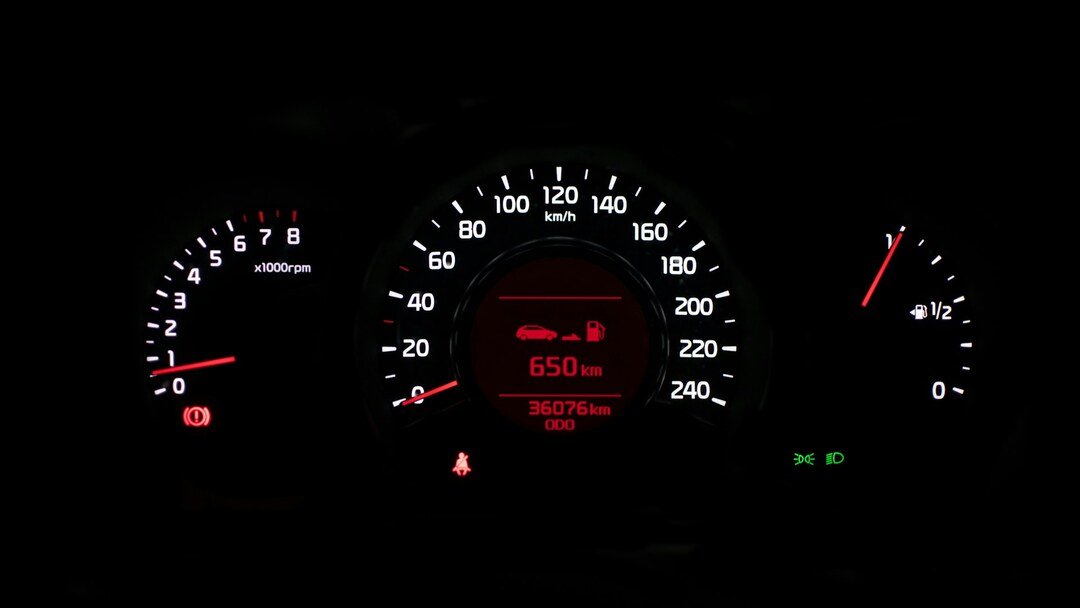Odometer Rollback
You'd think that with the advent of digital odometers, odometer fraud would be a thing of the past. Sadly, this isn't the case. An odometer rollback is still a prevalent issue in the used car market, with serious repercussions for unsuspecting car drivers. Performing a vin number check before buying can reduce the risk of falling victim to mileage manipulation. In this article, we'll deep dive into this illegal behavior, discuss how to detect it, and offer advice for those who may be a victim.
What is Odometer Fraud?

Odometer fraud, a serious crime involving the alteration of a vehicle's odometer reading, manipulates the mileage displayed, making it seem as though the vehicle has fewer miles than it has. This manipulation tricks potential used car drivers into paying an unfair price for a car that has seen more wear and tear than is immediately apparent.
Different Forms of Odometer Fraud
Odometer Rollback
Odometer rollback, one of the most common forms of mileage fraud, involves reducing the mileage reading on the odometer, effectively "rolling back" the miles the car has traveled. Both mechanical and digital odometers can be targeted, although digital odometers may be somewhat more resistant to tampering.
False Odometer Readings

Another form of odometer scam is when the vehicle's odometer is replaced or altered to display false odometer readings. This might be achieved by connecting the vehicle's circuit board to rollback equipment or using software to manipulate a digital odometer.
Moreover, this fraudulence isn't confined solely to digital odometers; perpetrators might employ antiquated methods to trick potential buyers. For instance, mechanical odometers in used vehicles, particularly those featuring an analog odometer, can also be susceptible to such fraudulent acts. The scam involves manually rolling back the numbers to display a fake mileage that's significantly less than the accurate mileage. Unfortunately, these unscrupulous practices make it challenging for used car buyers to ensure they're making a worthwhile purchase, highlighting the need for thorough inspection and vigilance when dealing with used vehicles.
Signs of Odometer Fraud
One of the best defenses against odometer rollback fraud is knowing the signs to look out for. For example, a worn-out interior or excessive wear on the brake pedal, steering wheel, and floor mats could suggest a high-mileage vehicle. Similarly, noticing discrepancies between the vehicle's condition and the mileage reported on the odometer could raise a red flag about possible odometer tampering.
Steering Wheel Wear and Tear

An unusually worn steering wheel in a vehicle purported to have low mileage is a potential red flag. Steering wheels naturally experience wear over time, so a pristine steering wheel on a car with high mileage or vice versa could suggest foul play.
Inconsistent Odometer Readings
Keep an eye out for inconsistent odometer readings, a common sign of tampering. These might include oddly misaligned digits on the odometer or differences in the mileage reported on vehicle inspection records versus the car's odometer.
Furthermore, inspect the odometer area closely for physical signs of tampering. In cars with a rolled back odometer, you might notice that the actual mileage does not match the odometer mileage. You may also observe missing screws or other signs of dismantling around the dashboard. This is usually a telltale sign that the odometer has been tampered with. When considering purchasing used cars, such discrepancies should raise immediate red flags about potential odometer problems.
Misaligned Digits on Odometer
On analog odometers, look for misaligned numbers or digits that are spaced too closely together, another tell-tale sign of tampering. However, don't let your guard down with digital odometers; fraudsters can also manipulate them to display false readings.
Additionally, mechanical odometers, typically found in older model motor vehicles, are not immune to these fraudulent practices. This type of odometer, a mechanical instrument in its essence, can be physically rolled back, making it appear as if the car has fewer miles than it actually has. Hence, the perception that a rolled back odometer is exclusively an issue for digital models is misleading.
The Seriousness of Odometer Fraud
An odometer rollback is more than just a dishonest scam; it's a crime. The National Highway Traffic Safety Administration estimates that odometer tampering cases cost American car drivers more than $1 billion annually. Despite this, many perpetrators manage to dodge the federal government and state enforcement agencies due to the complexity of the crime.
Consequences of Odometer Fraud for Car Buyers
Being an odometer rollback victim can have significant consequences.
Higher Price for Used Cars
The most immediate impact of mileage rollback on vehicle buyers is financial. When a vehicle's mileage is inaccurately reported as lower, buyers end up paying a higher price for the used car than it's worth. Moreover, the hidden cost of potential repairs and maintenance also adds up. Since the car has covered more miles than indicated, damaged vehicle components could lead to unexpected and costly repairs shortly after purchase.
Lower Vehicle Worth
When odometer rollback occurs, the vehicle's worth can plummet drastically, leaving the owner at a financial disadvantage if they decide to sell the vehicle. Additionally, the process of proving the fraud and seeking legal recourse can be time-consuming and costly. Moreover, the stigma of an odometer problem can make the vehicle harder to sell, even at a lower price, as potential buyers may fear hidden mechanical issues.
Unanticipated Maintenance Issues

Low mileage suggests less wear and tear, so buyers of cars with odometer rollbacks often face unexpected maintenance and repair issues, adding to the overall cost and inconvenience. In some cases, these repair costs can amount to more than the difference between the purchase price and the car's actual value. This can create a significant financial burden for unsuspecting victims, not to mention the safety risks associated with potentially undisclosed mechanical problems.
How to Detect Odometer Fraud
- Reviewing Vehicle History Reports
Always request a vehicle history report before buying a used car. These reports provide a detailed history of the vehicle, including registration history, the vehicle's damage history, and a record of the mileage at various points in time. Any discrepancies in the reported mileage are a strong indicator of an odometer scam. Furthermore, this report can alert you to any lien status, which would signify outstanding debts on the vehicle. It's a valuable tool that can save you from falling victim to mileage fraud and other potential scams, ultimately assisting you in making a well-informed decision about your purchase.
- Checking for Inconsistencies
Analyzing for inconsistencies in the vehicle's condition can reveal potential odometer tampering. Unusual wear and tear on the steering wheels, seats, pedals, or the vehicle's circuit board could suggest the car has been driven more miles than indicated on the odometer. A car with a low mileage odometer reading but exhibiting excessive wear is likely a victim of odometer rollback.
- Maintenance and Inspection Records
Referencing both inspection and maintenance documents is another effective method to authenticate a vehicle's mileage. Services that are routinely performed, such as oil changes, should include recorded mileage, offering a way to cross-verify the odometer reading.
However, keep in mind that there are unscrupulous individuals out there adept at "busting miles" and forging documents to deceive potential buyers. These fraudsters have been known to alter or forge maintenance records of a used vehicle to display lower mileage than the car has actually traveled. Despite the vehicle having its odometer rolled back, these forged documents might falsely indicate consistent maintenance history, making it even more challenging for buyers to spot odometer falsification. Therefore, it's crucial to ensure the documents you're viewing are legitimate and haven't been tampered with.
Steps to Follow if You're Suspicious of Odometer Fraud
If you have reasons to believe you're facing odometer manipulation, don't hesitate to report it to your local law enforcement authorities or your state's enforcement agency. Depending on the available evidence and the severity of the fraud, these entities can take necessary legal actions against the offender.
Further reading
Final Thoughts
Odometer rollback, a cunning and unlawful practice, unfortunately, remains a present-day issue. By staying alert and understanding what red flags to identify, you can shield yourself from becoming a victim of such scams. Never forget to validate the vehicle's condition, cross-check maintenance and inspection documents, and insist on a vehicle history report before finalizing your purchase.
Frequently Asked Questions
Determining the exact occurrence can be challenging, but estimates from the National Highway Traffic Safety Administration suggest that odometer fraud cases impact hundreds of thousands of vehicles annually.
Although digital odometers are harder to meddle with compared to mechanical ones, they are not entirely invincible to odometer tampering.
No, odometer rollback is considered illegal in most jurisdictions. It's classified as a form of fraud and is subject to legal penalties.
Always demand a detailed history report before buying a used car, inspect the vehicle thoroughly for signs of wear and tear inconsistent with the reported mileage, and examine the vehicle's service records for mileage data.
In case you suspect mileage fraud, you should immediately notify your local law enforcement agency or your state's enforcement agency. They can initiate an investigation and may take legal action against the offender if required. Being well-informed is key to sidestepping odometer rollback fraud, and it can save you from significant financial and emotional stress. As a rule of thumb, if a deal seems too good to be true, it probably is.







